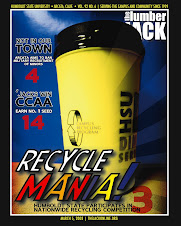
In the class critique some students said they liked:
- The editorial
- The cover
- The perilous plunge photo essay
- The hard hitting stories
- The improved layout of the forum section
- That the cover exaggerated the budget problem
- That you praised the 'Jacks in the editorial but gave them short shrift in the sports section
- That too many stories lacked art.
It had hard-hitting stories, clean copy and it looked great. But you still show problems with:
- Buried ledes
- Transitions between speakers
- Stories that read like press releases
- Boring headlines
- Story organization
- Making your stories compelling
- Grounding your reader
This was a well-reported story, chock full of good information. But it suffered from two problems:Poor organization and passive phrasing.

Remember the Burstiner Mantra:
What's the story?
Is the story about a budget? No, because the reader doesn't care about a budget. Instead the story is all the things the students, staff and faculty willlose because the state will shortchange the school once again. So the lede isn't the school faces uncertainty or that it learned some bad news. The lede is located in at the bottom of the third column, smack in the middle of the story:

Try moving your paragaphs around on second draft:
Next fall, expect HSU to eliminate some courses you might need, layoff professors you might like, and end services you might depend on. Expect even more crowded classes and higher student fees. That's because while the school expected to get almost $5 million more next year than it did this year, it now expects to get less. A lot less.
But if you are here, you're already enrolled. If you've got a brother, sister or cousin planning on coming in the fall, consider this: The budget cuts will force CalState to close the doors to some 10,000 students it could otherwise let in.
Each of the 23 CalState campuses is in this same financial boat. They've already swallowed a total of more than $500 million over the past eight years; that's almost $22 million per campus.
And despite the cuts, Humboldt State must still pay for increased costs of such things as utilities and salaries.
That means that the cuts must come elsewhere.
- Humboldt State was notified...
- Humboldt State is facing...
- The proposal was for a cut...
- Humboldt State was expecting to receive...

Too many digits break up copy flow and send readers to less tedious stories. It doesn't matter to most readers whether the story is about $4.7 million or $4,747,000. But the first number requires them to read five words (four point seven million dollars) while the more precise number takes nine words: Four million, seven hundred and forty seven thousand dollars. For more on how to use numbers in your articles, see this story.
Don't bury your ledes.
- The flu hits Humboldt: The lede was Kelly Ridgeway who came to school to take a history exam even though she was sick only to find people hacking all around her and who had the professor cancel two classes the next week because she was sick.
Meanwhile the kicker for that story was Stephanie Burkahlter who called it Deathbed 2008. - Horses: The lede was how in 2003 Sara Isaacson bought a quarterhorse who had gashes across his chest from being whipped.
- North Coast Parents: The group offers members a week of free meals to members when they give birth. That's pretty nifty and might call for a YOU lede: If you are in your fifth month of pregnancy consider joining Northcoast Parents. When the doctor delivers your child, they'll deliver a week a free meals. That that's just the beginning of the support the group offers.
 ve to ask: How does that work? A week worth of meals is 21 meals, does that mean that 21 different people each take a meal and drive it to Lolita if that's where the new parent lives? Does each member take a three meal day? Do they just call 21 different food delivery places and pay for delivery? A week of free meals takes five words to mention, but the coordination and volunteer time behind those five words takes a whole story to explain. And it gives you the opportunity to talk to the people who received these meals in the past and the committed volunteers who help organize and carry it out.
ve to ask: How does that work? A week worth of meals is 21 meals, does that mean that 21 different people each take a meal and drive it to Lolita if that's where the new parent lives? Does each member take a three meal day? Do they just call 21 different food delivery places and pay for delivery? A week of free meals takes five words to mention, but the coordination and volunteer time behind those five words takes a whole story to explain. And it gives you the opportunity to talk to the people who received these meals in the past and the committed volunteers who help organize and carry it out.Some stories ended with nice kickers
 But try breaking up your quotes for better effect:
But try breaking up your quotes for better effect:"I'm glad they're having an event like this, I can't wait to go and stuff myself," Moreno said.Instead:
"I'm glad they're having an event like this," Moreno said. "I can't wait to go and stuff myself."The same with this nice kicker:
But she also helps for the simple reason of loving them. "Just being next to one of these animals, cleaning its poop or whatever, settles my heart and mind," Zarnes said.Instead:
"Just being next to one of these animals, cleaning its poop or whatever," Zarnes said, "settles my heart and mind.
 Don't catch yourself churning out press releases.
Don't catch yourself churning out press releases.When you must use a press release to generate an idea for a story, view the release the same way you would an event you must cover. The event isn't the story; neither is what is on the release, at least not unless the release is about a vitally important piece of news.
The story is something else that touches people. So take a press release and look for the real story behind it. So a story about Patty Berg winning an award is not a story about Patty Berg or the award. It is the reason she won it, which is a bill that allows dying people to take control of where and how they die. How difficult was it for Berg to get that passed? What opposition did she face? How did she overcome it? What will she do now to further this type of legislative agenda? That's the story.
That means that either the headlines, the lead or the body of the story didn't give the story the life it deserved.
Take the story about the mediation group.
It is a story about a group of people who joined a non-profit (translation: they aren't in it for the money) to jump into arguments most people avoid. But the arguments they mediate are not the story here so your problem is that you have a story without conflict. Instead what makes it interesting is the contrast between what is normal or expected and what you present. This is known as the
Man bites dog story
 The reader expects a dog to bite a man. But for a man to bite a dog is the opposite of what you'd expect.
The reader expects a dog to bite a man. But for a man to bite a dog is the opposite of what you'd expect. Anytime you suspect you have a boring story to report look for unexpected contrasts: A rich person helping out poor people, a timid person who's a monster on the football field.
For a good example, look at the story on Sunshine week, which the reader might expect to be a glowing story about how much Congressman Mike Thompson is doing to promote transparency in government. Instead it begins with how hard it is for regular citizens to talk to a congressman, and the contrast between the ability of Thompson versus the normal person to access government info.
Ground your reader
The story about Jason Robo was confusing even if you knew a little abou
 t Jason Robo. Without knowing anything it seems as if the AS kicked off a guy for missing two meetings. That doesn't make sense. It mentions that he aired dirty laundry but it doesn't explain. You can't talk about dirty laundry without showing the dirt. Also you mentioned that he is active with NORML but you don't explain what that is and the little old lady in Fortuna has no idea. Meanwhile you left out that he is as active with 911Truth and that gets him labeled as an anti-government conspiracy theorist.
t Jason Robo. Without knowing anything it seems as if the AS kicked off a guy for missing two meetings. That doesn't make sense. It mentions that he aired dirty laundry but it doesn't explain. You can't talk about dirty laundry without showing the dirt. Also you mentioned that he is active with NORML but you don't explain what that is and the little old lady in Fortuna has no idea. Meanwhile you left out that he is as active with 911Truth and that gets him labeled as an anti-government conspiracy theorist.Paraphrase lousy quotes:
Why should that be in quotes? Use quotes when someone says something better than you can say it (and remember, you are the writer with the power of words).
"The best time to apply is the beginning of your senior year."
"Baloney!," she said the week before the fatal accident. "It'll happen over my dead body."Finally...
Nice job on editing.
This was the cleanest issue in terms of typos and grammars all year.

























1 comment:
I agree that this was the best issue of the term.
I also agree that the issue was lacking in art - but that was entirely on the writers. Multiple emails were sent out regarding info boxes and it was announced in class the prior week.
I told everyone that I would not accept anything after Friday and I held to that.
Whether or not we have more in future issues is up to each writer.
As for the 'Jacks being shortshifted, the decision was made to utilize the one color page we had with strong photos. We've been actively working to make the paper more visual and this was something we felt worked best, given the material.
But overall, an excellent issue.
Post a Comment